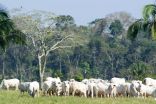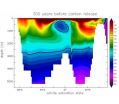Publishing today [May 12, 2015] in the journal Conservation Letters, the research team - including other UW-Madison scientists, the National Wildlife Federation, and IMAZON Amazon Institute of People and the Environment -- is the first to evaluate the impacts of these agreements, which are aimed at curbing the destruction of rain forests in Brazil.
The team found that these zero deforestation agreements prompted ranchers to swiftly register their properties in an environmental registry, led slaughterhouses to actively block purchases from ranches with recent deforestation, and saw lower deforestation rates among supplying ranches.
"We show that concurrent public and private supply-chain pressures could be a game changer, and help to finally break the link between deforestation and beef production," says Gibbs, a professor of geography and environmental studies in the Nelson Institute for Environmental Studies Center for Sustainability and the Global Environment.
However, the study also found that challenges remain to achieve zero-deforestation for beef production. Gibbs suggests that further investment by the beef industry and the Brazilian government to improve the agreements would pay high dividends for forest conservation.
Historically, expansion of cattle pastures has driven deforestation in the Brazilian Amazon, where these pastures cover about two-thirds of all the deforested land. The state of Para, where the study was based, has the largest cattle herd in the Amazon biome.
In 2009, under concurrent pressure from Greenpeace-Brazil and the federal prosecutor's office in Para, the region's largest slaughterhouse owners publicly committed to buy cattle only from those ranchers who ceased clearing rain forests and who registered their properties with Brazil's rural environmental registry.
The three largest companies -- JBS, Marfrig, and Minerva -- also vowed to set up monitoring systems to track deforestation on their supplying properties.
Gibbs and her team focused on JBS, the world's largest meatpacking company, and began by mapping the locations and land use histories of every cattle ranch that sold to JBS, before the agreements and after. They also interviewed ranchers to gain on-the-ground perspective about the changes they were or were not making following the agreements, and used rigorous statistical and spatial analysis to track changes in rancher and slaughterhouse behavior.
They found the agreements rapidly incentivized the company's supplying ranchers to register their land, as mandated by a state law in 2006. Prior to the agreements, only 2 percent of JBS' suppliers had registered their properties. However, 60 percent were registered within the first five months of the zero-deforestation agreements and by 2013, nearly all suppliers were registered.
In fact, JBS suppliers registered their properties two to three years sooner than neighboring properties that did not sell to JBS. Importantly, interviews with these suppliers revealed that 85 percent did so in order to continue selling to the company.
Additionally, Gibbs' team found clear evidence that slaughterhouses actively blocked ranches with deforestation, in sharp contrast to their practices before the agreement. For instance, the study found that before 2009, nearly 4 in 10 of JBS's direct suppliers had recent deforestation and by 2013, this number dropped to fewer than 4 in 100.
In response to these market signals, the supplying ranchers that sold to JBS after the agreements also dramatically reduced their deforestation overall and cleared only half as much rainforest as the properties JBS stopped buying from following the agreement.
"Public enforcement of environmental laws is a formidable task in the Brazilian Amazon, which covers an area six times the size of Texas," says Gibbs. "But these market-based interventions are leading to rapid changes in the beef industry within a period of months, even in very remote areas."
While these are important and encouraging results, Gibbs says much work remains to be done, since many ranchers are able to bypass the agreements. For example, the study found that slaughterhouses currently only monitor the fattening ranches from which they directly buy.
"In Brazil, cows are moved around to multiple farms before they reach the final fattening farm that sells directly to the slaughterhouse," says Gibbs.
Cattle can be calved, reared, and fattened on properties with illegal deforestation and then simply moved to another "clean" farm -- one without deforestation -- just prior to sale to JBS. Though the cattle may have spent a significant portion of their lives on farms with recent deforestation, the final ranch supplying JBS is still compliant with the agreements. This "laundering," Gibbs says, can be a shell game.
Ranchers may also bypass the agreements by selling to one of the many slaughterhouses that do not monitor their supplying properties, presenting another challenge to reducing deforestation in the beef industry.
Paulo Barreto, senior researcher at IMAZON and co-author of the paper, says the agreements need three developments to reach their full potential: First, they should involve all ranches in the cattle supply chain, including the ones specialized in calving and rearing. Second, the entire meatpacking industry should monitor its suppliers. Third, the government should increase the quality and transparency of public information used by private companies to enforce the agreements.
Gibbs is encouraged by the findings and the potential for industry to help drive change through such market-driven agreements. She has observed what she calls "a gradual sea change," which has gained momentum over the last year or two.
For instance, another research study she recently published in Science describes the impact of an agreement brought about with support from major retailers, like Walmart and McDonald's, to stop buying from producers in the Brazilian Amazon that clear tropical rain forest to grow soy.
"Every few weeks we see a major global corporation come forward and commit to removing deforestation from their supply chain," says Gibbs. "These multinational companies have long profited from the exploitation of tropical forests, but they're now at the forefront of an environmental movement to reduce the deforestation caused by agricultural expansion."
INFORMATION:
The study was supported by the Gordon and Betty Moore Foundation and the Norwegian Agency for Development Cooperation's Department for Civilian Society under the Norwegian Forest and Climate Initiative. More information about the link between deforestation agreements and the cattle industry can be found at a new website created by the National Wildlife Federation at http://www.zerodeforestationcattle.org/.
Kelly April Tyrrell, kelly.tyrrell@wisc.edu, 608-262-9772




